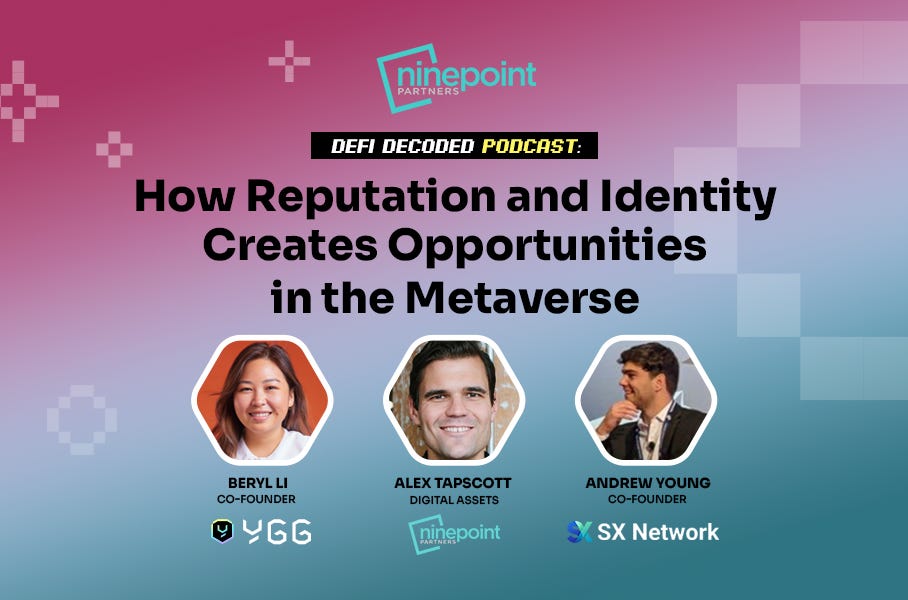The DeFi Decoded Podcast by Ninepoint Partners: How Reputation and Identity Creates Opportunities in the Metaverse
YGG Co-founder Beryl Li joins Alex Tapscott and Andrew Young on DeFi Decoded to discuss how YGG is leveraging web3 reputation and identity to create more opportunities for players.
The DeFi Decoded podcast is hosted by Andrew Young, co-founder of the SX Network and Alex Tapscott, Managing Director of the Digital Assets Group at Ninepoint Partners. The podcast is focused on simplifying the basics of Decentralized Finance (DeFi) and how the technology empowers people and organizations with the ability to transact, create value, and participate in economies without relying on a centralized authority.
In this episode, Beryl Li joins Andrew and Alex to talk about how YGG is building a reputation system based on guild members’ achievements using Soulbound Tokens, and how this opens up opportunities for both players and game developers. The trio also touch on other points such as YGG’s recent rebranding process and a glimpse into the guild’s 10-year outlook.
The following is an excerpt from this episode of the DeFi Decoded podcast by Ninepoint Partners. Watch the full recording on YouTube.
Inside the World’s Largest Web3 Gaming Guild with Beryl Li of Yield Guild Games
Alex (20:30): You mentioned something there about avatars. That's another theme that I'm really interested in, which is identity and reputation, or proof of human-ness. As I've heard you say before in the past, if YGG is how someone builds an identity in the open Metaverse that gives them ways to earn money or access financial services. In a way, you've helped them to bootstrap a reputation for web3. And you have become the platform or the way in which that has happened. So, can you tell us a little bit about that? Because identity seems like this incredible opportunity for reimagining reinvention.
Beryl (21:14): Identity is a very important component if you want more individuals to be protected and be able to access opportunities in the Metaverse. So within YGG, we're building a reputation system based out of Soulbound Tokens as a first layer. It is based on achievements. So for example, if an individual is able to pass certain quests, it can be proven on-chain. We're able to provide them a non-transferable NFT, a Soulbound Token. A combination of all of these Soulbound Tokens tell a story about the individual. And based on that, the holders are able to access, for example, other games or communities.
Another application of on-chain reputation I can think of is using it to promote new projects. If I want to promote my new fashion game, I need to identify the potential players who have a keen interest in fashion. By doing this, I can initiate a marketing campaign by offering an NFT AirDrop to those who already own a World of Women NFT or have played similar fashion games in the past that can be proven through owned NFTs.
Utilizing reputation as a marketing tool can lead to various activities such as unlocking opportunities for uncollateralized loans. For example, I can take out a loan or mortgage based on my skill, interests, and hours spent playing the game, and my earnings from the online game.
Alex (23:16): I find that to be a real inversion of the web2 model. Where in the web2 model, the data is the moat. The fact that you have all this information about customers allows you to continue to sell them things. And the absence of that information is what keeps your competitors out. So that means that this data pool is the most important thing.
But in a world where all of that information is contained in a Soulbound Token, which is in a digital good, that's tied to an individual. Then the individual is like taking all that information with them everywhere they go making that information open to the public.
So it really eliminates that moat in a way and reduces the importance of data as an asset class for an organization but almost enhances it in other ways. I don't know if you have any opinion on that. I'm trying to tease out just what the significance of that is, it seems meaningful.
Beryl (24:10): Definitely on-chain data is something that's verifiable. So that's pretty unique in the web3 space. One more thing is it's more inclusive, because there's certain activities that don't require other third parties to know whether you're male or female, or whether you're living in South America or the Philippines. And it offers you the same opportunities based on your on-chain activities or your achievements without revealing your gender, location or any other information and data.
You can watch the full podcast on the Ninepoint Partners YouTube Channel.
Follow Beryl, Alex and Andrew to learn more about them.
Join the YGG Discord or follow us on Twitter for future updates.




